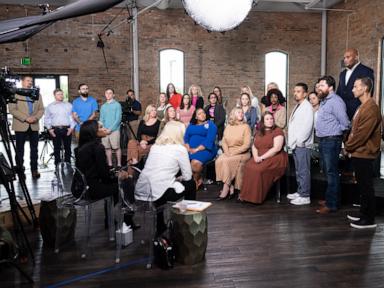


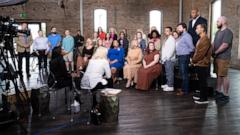
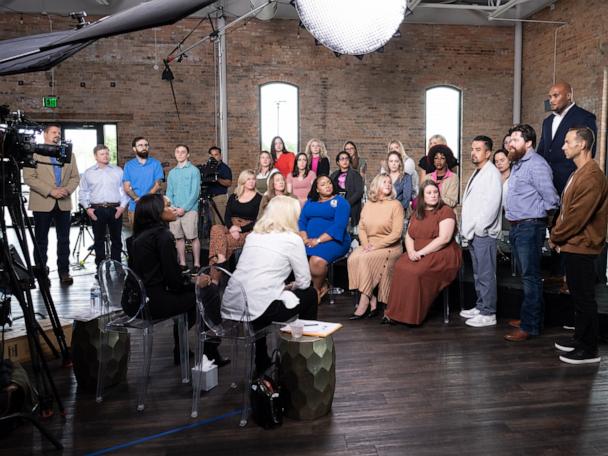
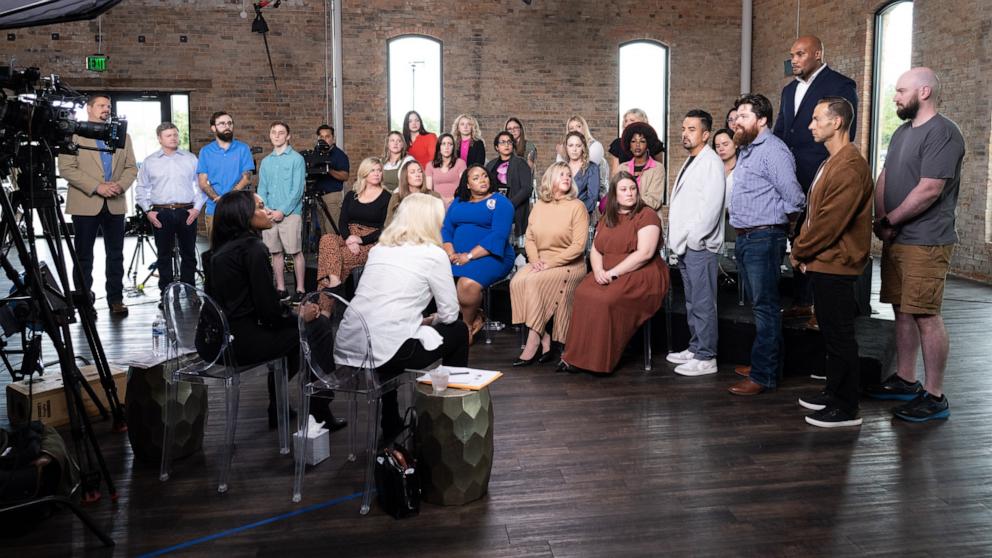
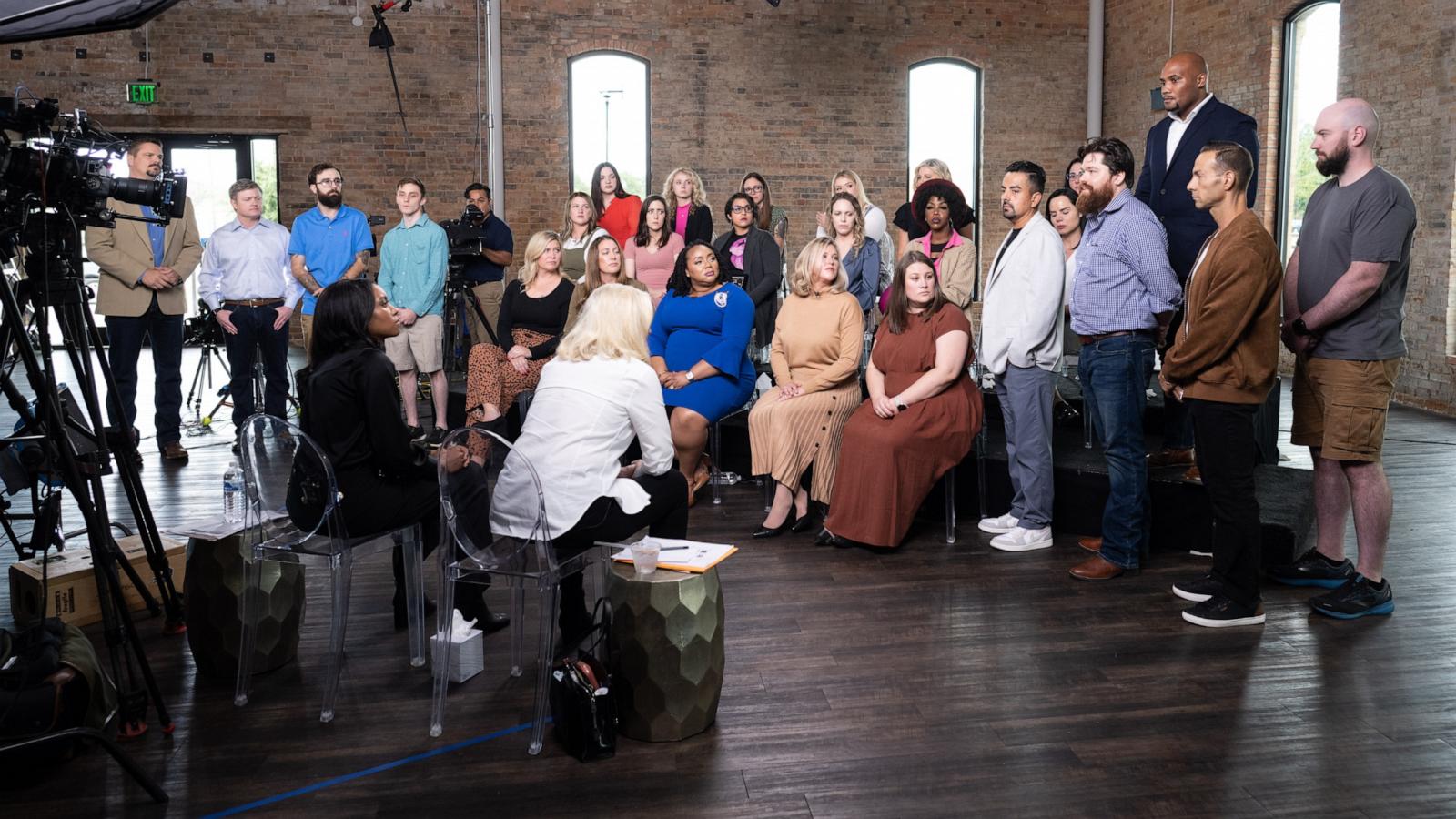
ABC News brought together 18 women from across 10 states who say their medical care was impacted by abortion bans — bringing some of them to the brink. These women said they have been turned away in medical emergencies for not being sick enough and had their health care delayed or denied due to state laws.
The women were not alone. Their partners walked alongside them on the journey, and together they faced the life-changing fallout from abortion bans in their home states. This story details these men’s experiences — in their own words.
Stephen Anaya was thrilled when he heard the news that his wife Kristen was pregnant with a girl. The two had been trying to have a baby for more than two years, and both had medical procedures to help make their dream a reality.
But when Kristen Anaya’s water broke earlier than it should have — when she was only 15 weeks along — and she lost nearly all her amniotic fluid, the couple faced the heartbreaking news that nothing could be done to save the fetus.
Looking back, Stephen Anaya said that losing their baby, who they named Tylee, was “devastating” and hurt him a lot — but that quickly turned to worry and fear for his wife.
“When someone tells you — for me, on my side — you could potentially lose your wife, after me losing my daughter, was very scary,” Anaya told ABC News in an interview.
“I could potentially be losing two family members, and then I’m gonna be in charge of my stepson. And it was just very scary to deal with and then seeing her hour by hour literally get sick,” Anaya said.
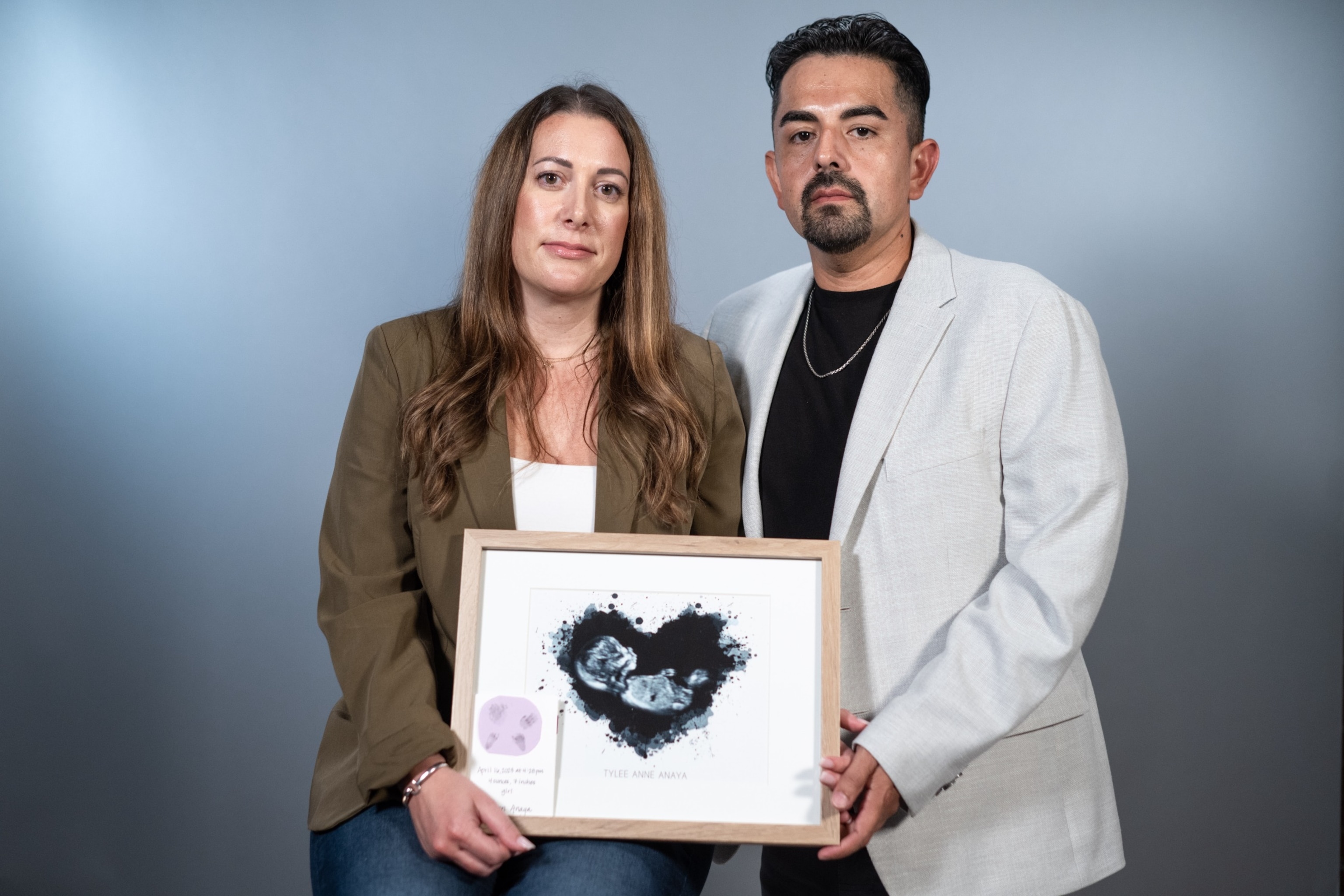
Kristen Anaya with her husband Stephen, had her water break when she was four months pregnant. Despite there being no chance that the baby could survive, Anaya was told she had to get very sick before doctors could intervene. She went into sepsis.
Brandon Thibodeaux for ABC News
The Anayas live in Texas, which is one of 21 states currently enforcing strict abortion restrictions after Roe v. Wade was overturned. The state’s laws, which prohibit nearly all abortion care, prevented Kristen Anaya from receiving immediate care when she was first admitted to a hospital because she was not yet sick enough.
While the state bans have an exception to save the life of the mother, physicians and lawyers say that the exception is unclear and has, in practice, resulted in care only being provided in the most severe cases, when patients are sick enough.
So, over the next 24 hours, Kristen Anaya would go into sepsis before doctors were able to give her lifesaving care in line with the medical emergency exception in the state’s bans.
The “Impact by Nightline” broadcast, “On the Brink,” with exclusive interviews by Diane Sawyer and Rachel Scott, brings viewers inside the raw, intimate, and overlooked conversations playing out in clinics and exam rooms as the country continues to confront the realities of a post-Roe America. It is now streaming on Hulu.
Stephen Anaya is one of nine men gathered by ABC News who have never met before but share a common experience they say they would not wish on anyone — their partners’ care has been delayed or denied due to abortion restrictions.
All of the women’s partners were invited, but not all could make it to Texas.

Impact X Nightline
ABC News’ Diane Sawyer and Rachel Scott report on pregnant women with high-risk pregnancies in states that have enforced their own laws since the Supreme Court overturned Roe v. Wade.
‘I had her wrapped in ice packs’
Stephen Anaya remembers watching his wife, with a high fever and shaking uncontrollably, as she lay in the hospital.
“She’s begging me to like cover her. And I’m like, ‘I can’t — you can only have a sheet, nurses and doctors said your temperature is too high,'” Anaya said.
“We put an ice pack on her and not even like 5 – 10 minutes later, it’s melted. All over her body, I had her wrapped in the ice packs,” Anaya said.
Anaya said he felt angry that the laws were keeping his wife from being able to get the help that she needed.
“I have to step up and be here for her because I could lose her. And what does this mean? And then [I was] pissed in a way because we were there for help, and we can’t get it even though I know the doctor wanted to, I could feel it — [the doctor] was stuck and her hands were tied,” Anaya said.
After Kristen Anaya was released from the hospital, Stephen Anaya remembers checking her temperature after she fell asleep, worried that she would get sick again. Anaya said he still worries about his wife’s health.
“She’s better now — I see that — but it’s like, how did that impact her long term, of her getting that sick?” Anaya said.
The couple is trying to get pregnant again, possibly with the help of a surrogate, but it has been “nerve-wracking” and what happened with his wife’s last pregnancy is “100% on our minds,” he said.
“What could happen doing the surrogacy thing and putting someone else at risk?” Anaya said.
The couple medically cleared a surrogate and Kristen Anaya recently underwent an egg retrieval. They are waiting to find out if the fertilized eggs develop into embryos.
Feeling helpless
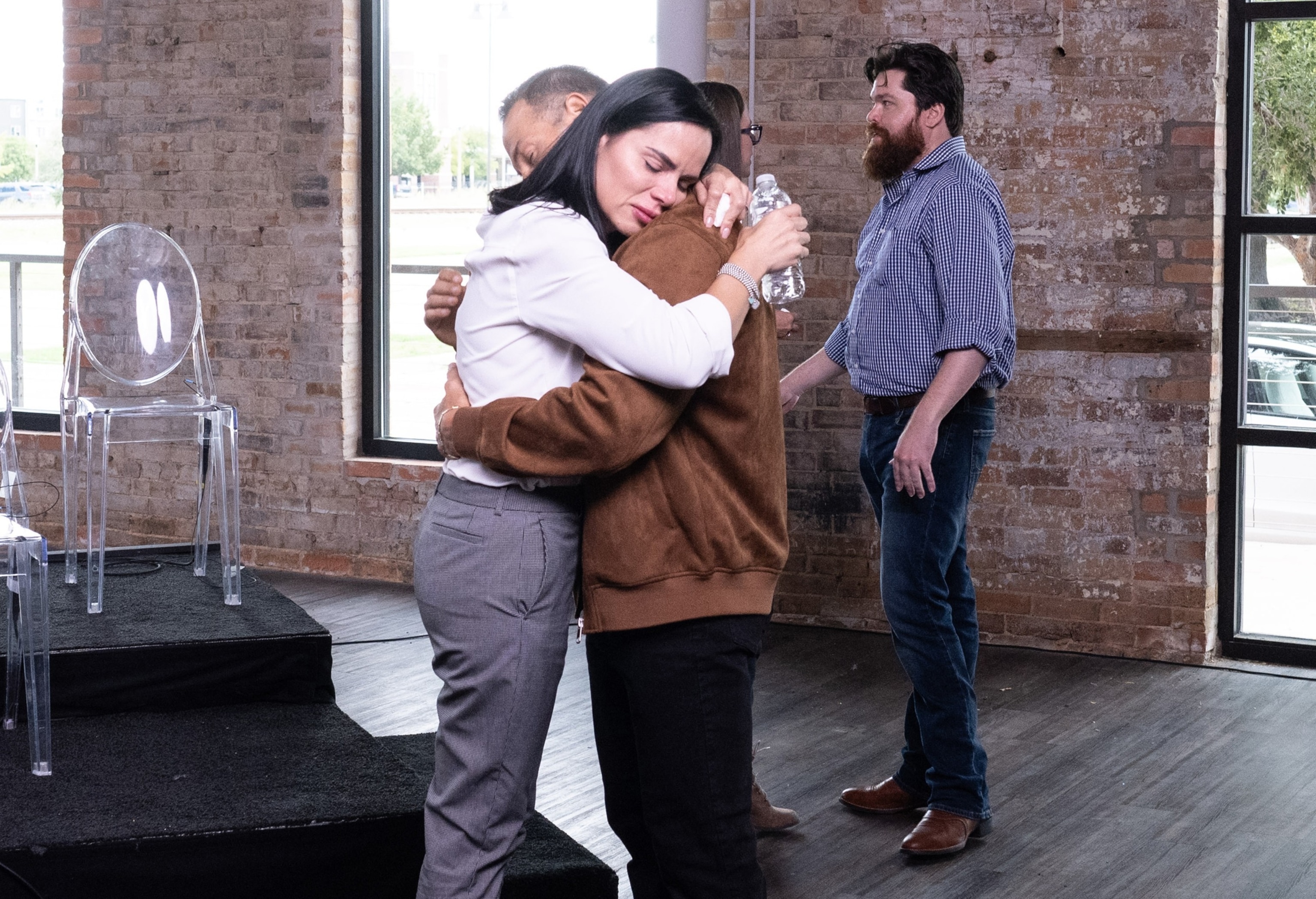
Anabely Lopes and her husband embrace after 18 women sit down with Diane Sawyer and Rachel Scott for an emotional interview.
Brandon Thibodeaux for ABC News
Marco Dalabona and his wife Anabely Lopes, who live in Florida, received terrible news that their fetus was diagnosed with trisomy 18, an anomaly described by doctors as incompatible with life. Lopes was 15 weeks along.
“When you have to support her, and then you see her in that situation, that you can’t do nothing, you feel very weak and then you get sad,” Dalabona told ABC News’ Rachel Scott.
“It’s not only her dream. When you think about family — we all think about that. It’s not only a girl’s dream to have a child,” Dalabona said. “It’s also our dream.”
But, because the state prohibits abortions after 15 weeks, Lopes was unable to get care in her home state — despite Florida’s law having exceptions for fatal fetal anomalies.
Lopes traveled 1,000 miles from Miami to Washington, D.C., to receive care.
South Carolina couple Matthew and Jill Hartle learned their fetus had a birth defect called hypoplastic left heart syndrome — resulting in multiple severe heart anomalies. But, despite the state’s law having exceptions for fetal abnormalities, Jill Hartle said she was unable to get care in her home state.
“We all made the correct decision to protect our family — for my daughter, for my wife. And I was told that’s incorrect and that’s not allowed. And that’s not fair. And there was nothing else we could do. And it feels so helpless. And then to add trauma to our already tragic situation — is an impossible situation,” Matt Hartle said, during a group interview with the men gathered in Texas.
“I was not allowed to protect my wife like she deserved,” Hartle said.
“A lot of us feel like the protectors of the family,” Hartle said. “And then now we have outside sources telling us how to be fathers.”
The Hartles traveled to Washington, D.C., to get care, but it took them 49 days.
“We’ve just been rocks for our spouse. And I — we didn’t really realize others are going through it. We all felt — at least for me — I felt really alone during the process. There’s no outlets,” Hartle said.
“It’s unbelievable how many people — how many decision-makers — I’ve come across that say, ‘I had no idea a fetal anomaly exists,'” Hartle said.
Like Kristen Anaya, Derick Cook’s wife Anya Cook suffered preterm premature rupture of membranes, when a pregnant woman’s water breaks and the amniotic fluid is lost before the fetus is viable. But Anya Cook — who was 16 weeks pregnant — lives in Florida where a 15-week ban is in effect.
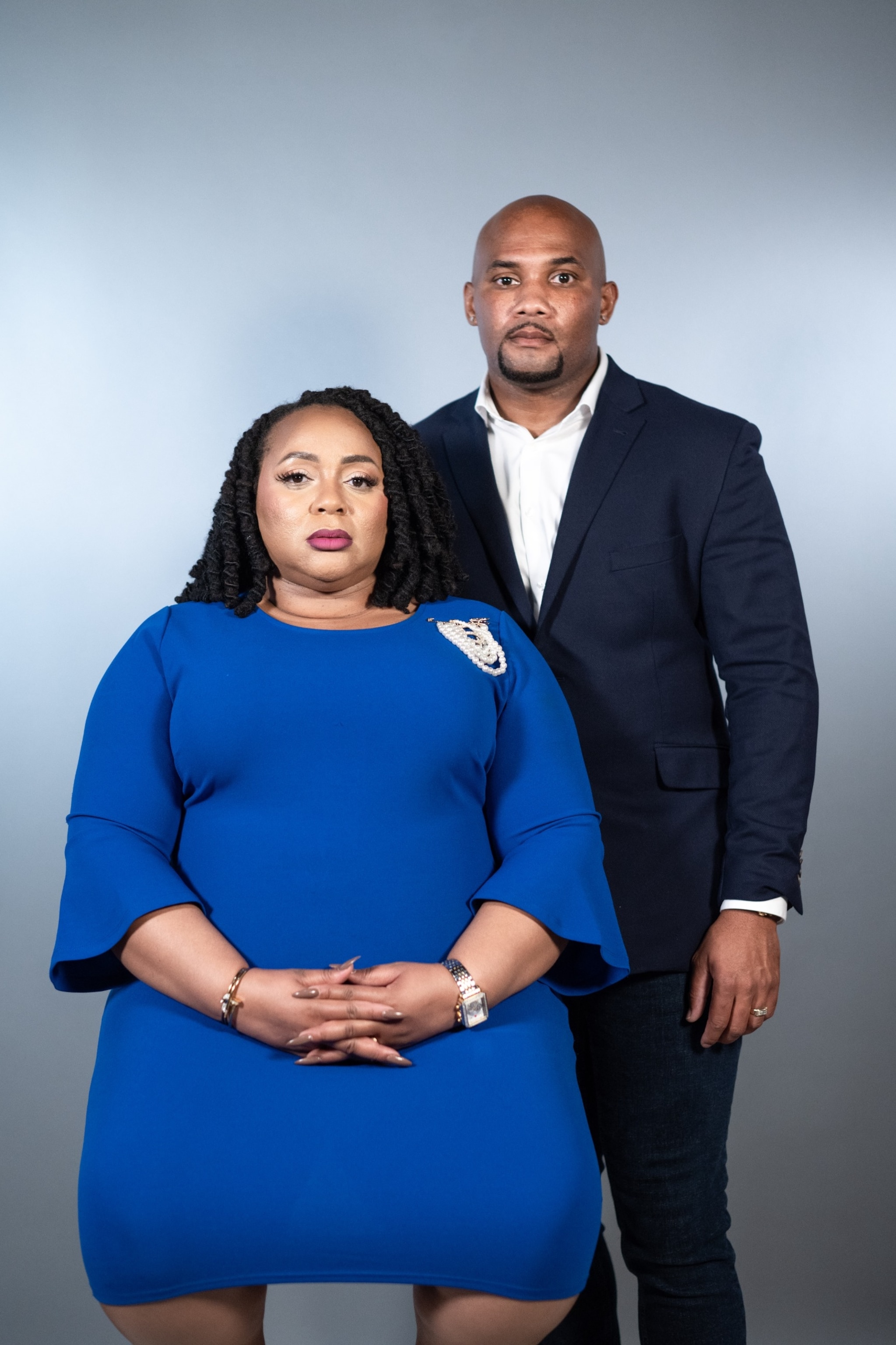
Anya Cook and her husband Derick.
Brandon Thibodeaux for ABC News
In states without restrictions, she would have been offered an immediate termination to protect her health, but in Florida she was given antibiotics and sent home, told to return immediately if her symptoms worsened.
Cook delivered the fetus alone in the bathroom of a hair salon, hearing her daughter hit the toilet. In the process she lost a life-threatening amount of blood, became critically ill, was put on a ventilator due to blood loss and was in the hospital for six days.
“For me, it’s emotional,” said Cook. “Because a lot of men step back — they don’t think this is their issue.”
Derick Cook said almost losing his wife was “the most traumatizing thing” he has experienced in his life.
“Our hearts hurt. We feel the pain. We go through the emotions. Some of us are in counseling. I know I’m in counseling because of this. You know, I wasn’t– I felt like my voice was shut out of this, until I got counseling and was able to talk about it,” Cook said.
“They took the privilege of — of us being the head of the household. And they just took whatever our feelings, and the stuff that we was going through, and they just diminished it,” Cook said.
Clay Blackmon and his wife Alyssa Gonzales received the devastating news that their fetus had trisomy 18. The fetus had two holes in his heart, no nose bone and his brain had not developed.
But in Alabama, where nearly all abortions have ceased due to a strict ban, they were unable to receive care. The couple drove over 12 hours to Washington, D.C., to a clinic that they said was packed with patients.
“People were shoving each other out of the way. And a woman, her water broke on the floor. And she was about to give birth,” Clay Blackmon said.
“I feel like this is the issue that you run into when you don’t give people options. When you make it only certain states, and only these certain places, it becomes very narrow window. And you have all these women that are flooding in there, just trying to have a solution to the tragedy and the trauma that they’re facing,” Blackmon said.
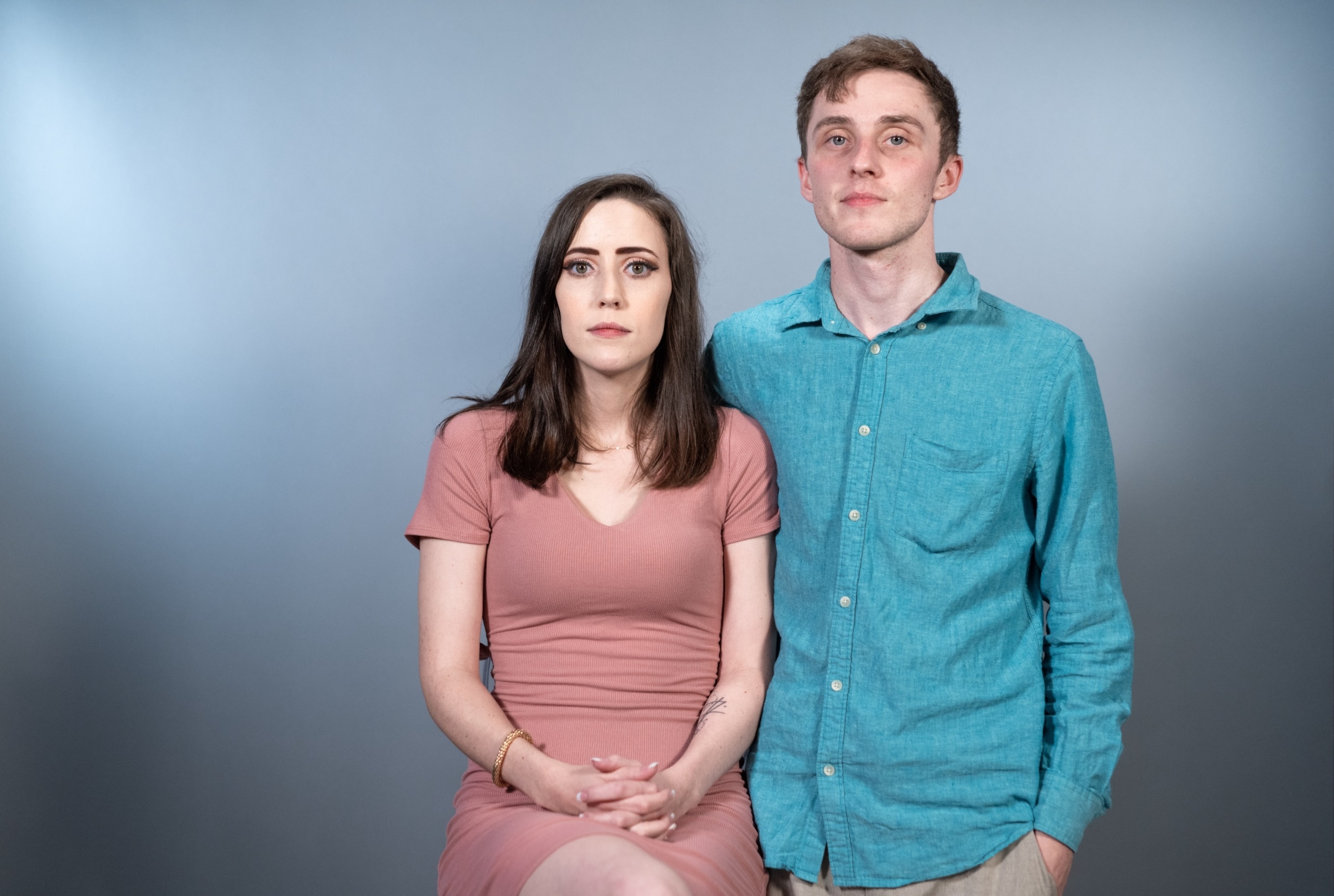
Alyssa Gonzales was unable to get care in Alabama for a fetus with Trisomy 18, a condition described as incompatible with life.
Brandon Thibodeaux for ABC News
The couple decided they would not be getting pregnant again — Gonzales had a surgical sterilization.
“Why on earth would she wanna risk that again? Because if — if we were to have another child with a fetal abnormality, then we would have to go through all of this again. She barely got through it the first time,” Blackmon said.
“I couldn’t be back there to support her in any way and she crumbled. And she could not take that again, nor could I, for that matter. I could never see my wife like that again,” Blackmon said in a group interview with the eight other men.
“And it wasn’t until today that I spoke with all these men, ’cause men typically like to suppress things. We try to be strong for our women. But I didn’t realize how much it affected me until today, and how much of it comes surging back to me,” Blackmon said.
‘Trauma’ changed his view on abortion
Thomas Stovall said his tragedy has made him see the issue of abortion differently.
“Some of us were already for abortion, some of us were against it. In my personal opinion, I was 100% against it,” Stovall said.
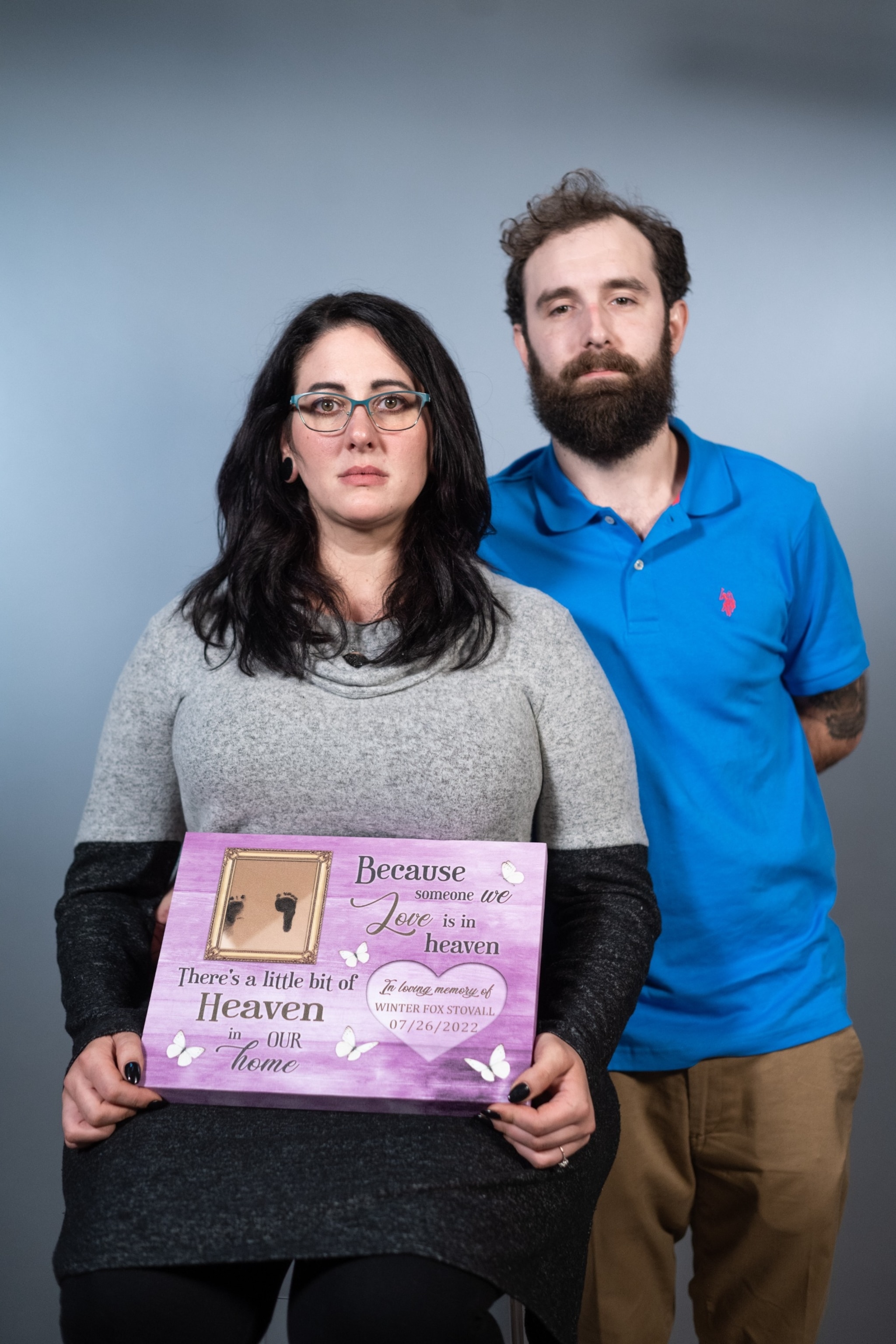
Chelsea Stovall’s fetus was diagnosed with multiple anomalies, but she was unable to get care in Arkansas.
Brandon Thibodeaux for ABC News
Stovall said he grew up deeply religious and was against abortion his entire life until he and his wife Chelsea learned their baby was growing without a diaphragm — a condition that medical experts say is incompatible with life.
Stovall said his daughter’s diagnosis made him change his mind.
“The fact that she had no chest cavity, her organs were wrapped around her heart, her — she was 20 weeks old and had the size of a 2-week-old. And she had less than a 5% chance to even make it to the term. I had to go through such a traumatic trauma experience to change my view,” Stovall said.
“We’re terrified to have another child. I want a big family. I want kids. But we’re terrified,” Stovall said.
Chelsea Stovall later told ABC News that she and her husband do not plan to have more children because of their fear that this could happen again.
At 12 weeks of pregnancy, John Adkins and his wife received devastating news that their fetus had excess fluid and skin edema — signs of cystic hygroma — and that her fetus likely had Turner syndrome — a rare condition that results from one of the X chromosomes missing. Adkins’ doctor told her the fetus would not survive and she was surprised Adkins had not miscarried already.
Idaho couple Jen and John Adkins describe the anguish they felt when fleeing their home state to terminate their non-viable pregnancy.
The couple was told that if the laws in Idaho were different, she would have just been referred to an abortion clinic. But because Roe had been overturned and Idaho’s near-total abortion ban was in effect, they were afraid to refer her to any clinic, even one out of state.
“We should not be collateral damage. When a family goes through something like this, the state should be there to comfort, and to provide help and resources, not to punish, or to make you flee your own state,” John Adkins said.
“I’m a six-generation Idahoan. I’m very proud to be one. I had to leave the state. I had to drive six hours away. Couldn’t be with my family. Couldn’t be with my friends,” Adkins said.
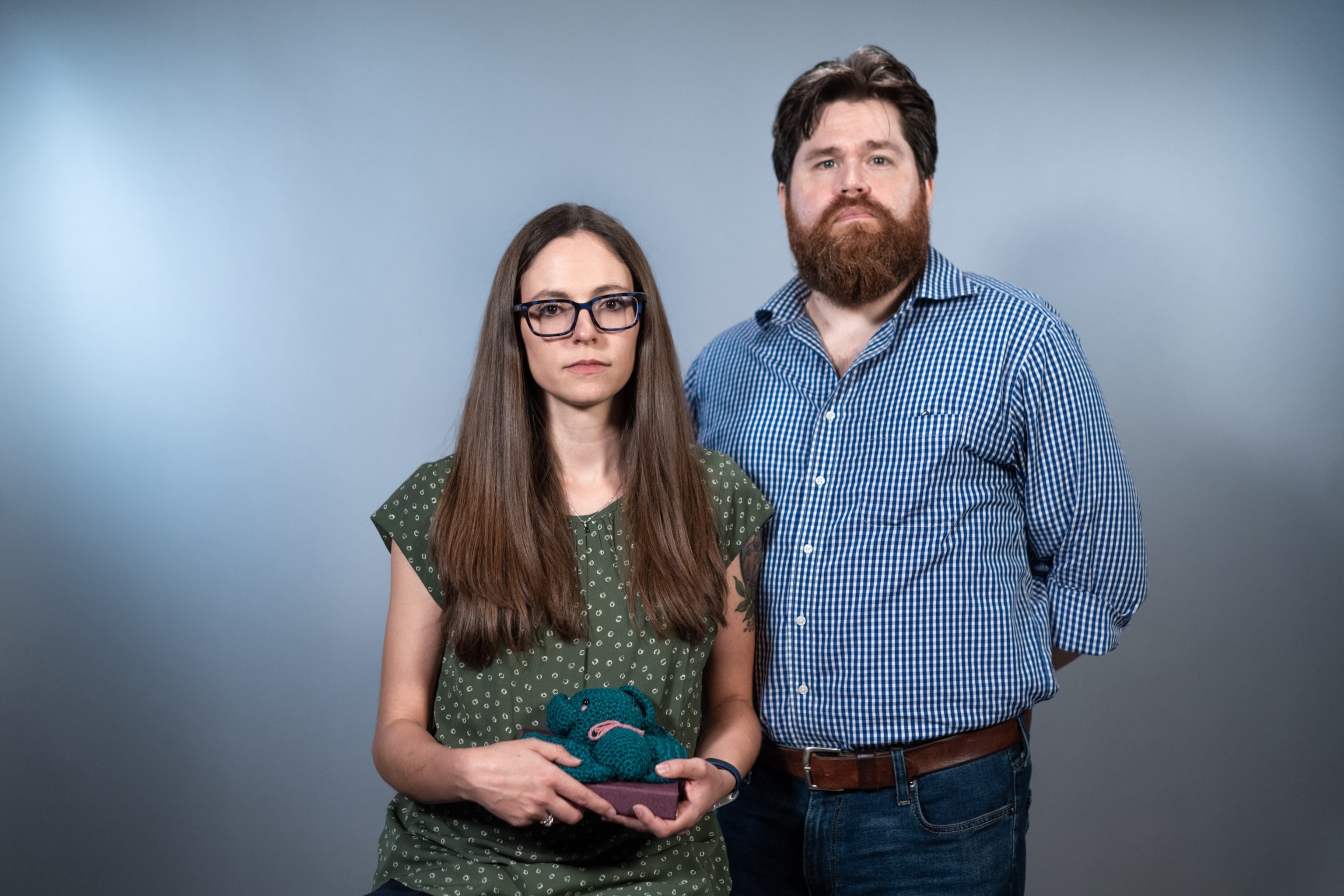
Jennifer Adkins, a 31-year-old mother from Idaho with her husband John, was at a routine 12-week ultrasound when she learned that her fetus would not survive. She is now the lead plaintiff in a lawsuit against the state over its ban.
Brandon Thibodeaux for ABC News
With financial help from family, friends and two abortion funds, the couple was able to finance a trip to Oregon for an abortion.
“It made me feel like a criminal. It made me feel — like I was putting myself, my wife in jeopardy, our medical professionals in jeopardy,” Adkins said.
The men told ABC News that it is important for them to share their stories.
“My wife’s voice falls on deaf ears too often. And I’m tired of it. And so I think as — as men, that’s — that’s the role now, speak up, and help that future family. I don’t want anyone else to go through what we just went through,” Hartle said.
Stovall said they are sharing their story for other women.
“To fight for the future of our kids, and the future of women, to have a choice. They shouldn’t be left with no choices. Like, if your baby is not gonna make it, then; then today, the way the laws work, we’re left with really no options. And those women shouldn’t be left with no option. And they should be able to say goodbye when they — when they — to their child, when they want to, not when somebody else wants to,” Stovall said.

